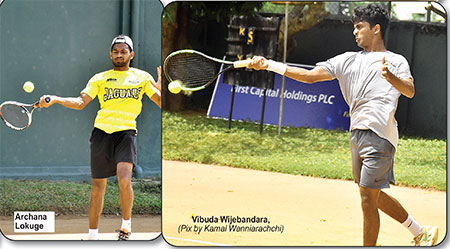Sports
A champagne exit from Lord’s

36th Anniversary of Sri Lanka’s first ever Test match at Lord’s – Part 3
by Rohan Wijeyaratna
The story of this match will serve as a testament not only to the abilities of the 1984 Sri Lankan team, but also to the long cricketing tradition established through the commitment of many generations of past Ceylon cricketers, the country’s wonderful nurseries – the schools, the indefatigable coaches and the clubs that dot the island. All of them played an unseen hand in moulding the Sri Lankan sporting pedigree; an outpouring of which was seen on the first two days at Lord’s. Even though it appeared at the start that there would be only one winner and the game would be one-sided, by the end of day two many were of the view that the most agreeable cricket they witnessed during the entire summer was played on the first two days of this Test at Lord’s and the more deserving side was now on the ascendancy. Denis Compton when I met him at the end of day two put things in perspective. “You chaps today taught us how to bat” he said with disarming candour. There could have been no greater praise, coming from probably England’s finest post war batsman. Others of note – including Tom Graveney expressed similar sentiments. These were indeed heady days for all those who were from the Sri Lankan camp, be they players or spectators alike.
End of two epic innings
There was greater purpose and hurry seen in the Sri Lankan approach when play resumed on Day three. Mendis heaved at anything and everything, while Wettimuny was happy, playing away from his body and relying on his previous day’s form and eye. Something had to give, and it did. Wettimuny forcing Allott on the off from where he stood, managed to deflect a catch behind. That announced the end of an epic feat of endurance which lasted altogether, 642 minutes. It was till then, the longest innings ever in a Test match at Lord’s, and served as the cornerstone upon which the entire innings was built. Shortly thereafter, Mendis heaved at Pocock and holed out to Fowler at long-on. With each of those exits, the crowd rose, as a mark of their appreciation of two magnificently contrasting styles of play which lit up Lord’s in the two preceding days. The applause was long and sustained.
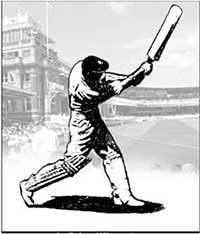
The Sri Lankan intention now appeared plain as pikestaff. De Mel being no mug with the bat, dealt some mighty blows while little Aravinda on his Test debut produced a stroke filled short burst before Mendis declared at 491 for 7. It was the highest ever score by a team playing their maiden Test in England. The closure left Sri Lanka 20 minutes of bowling before lunch.
Posterity might have been better served had the Lankans registered 500 in their very first Test outing at Lord’s, but the decision to close was not without an attacking intent. England were low in form and down in spirit, and to attack them with the new ball on either side of lunch, would give the Lankans their best chance of grabbing some early wickets. Or so they thought.
England’s first requirement was making 292 to avoid the embarrassment of a follow-on. After Fowler had escaped a near catch in the gully to the very first ball from De Mel, Vinothen John bowled a lot of tripe from the other end. It was embarrassing to watch a string of full tosses being delivered at a time when the calling was to put the batsmen under pressure. At lunch, England profiting from this unexpected windfall, were 32 for 0, after 5 overs of rapid batting. With ‘DS’ not making an appearance due to an ankle injury, bleak times portended for the Lankans.
Wretchedly out of form ….
Shortly after resumption, Fowler departed, slicing a catch to second slip. That heralded the most extraordinary passage of play in the match. Vinothen John had by now settled down while De Mel kept steaming in, giving all he got. But they both were far from menacing. The third seamer Ratnayake was largely innocuous, while D.S. de Silva making his appearance only after lunch, bowled his stock-in- trade top spinners nursing a sprained ankle. Against an attack so debilitated, Tavare and Broad went into near slumber. What followed was perhaps the most forgettable passage of play seen in a Lord’s Test for a long time. In 27 dreary overs between lunch and tea, England advanced by 49 runs, with Broad making 19 of them. Together with Tavare, the pair prodded and pushed with infuriating ordinariness, while making the Sri Lankan bowlers seem twice as threatening as they actually were. The batsmen were so out of touch, they allowed ample time and opportunity for a hopelessly ill tuned Sri Lankan attack to find its feet and some rhythm. Tavare having batted toothlessly for 20 overs, advanced to 12 by tea and when he finally went shortly after resumption for 14, he left behind the memory of a man who was so wretchedly out of form, he could hardly hit the ball outside the square.
Woodcock said it all….
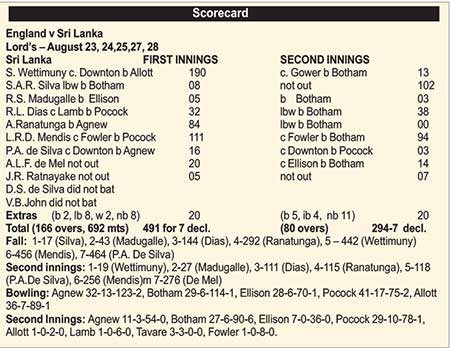 Broad not to be outdone was similarly comatose. While surviving two close lbw decisions from a tireless De Mel, he was twice dropped into the bargain. Gower the new man in, was only marginally better. By close of play 29 overs after tea, the pair had added only 58 runs more to England’s teatime score. The crowd expressed their disapproval unreservedly with some heavy barracking rarely heard at Lord’s. The two sessions since lunch had produced only 107 runs against an attack that was out of fitness and out of form. England were 139 for 2 by the close, with only 105 runs coming off their last 56 overs. John Woodcock writing in the ‘Daily Telegraph’ said “No self-respecting club side would have been content with the way England batted”. And that said it all.
Broad not to be outdone was similarly comatose. While surviving two close lbw decisions from a tireless De Mel, he was twice dropped into the bargain. Gower the new man in, was only marginally better. By close of play 29 overs after tea, the pair had added only 58 runs more to England’s teatime score. The crowd expressed their disapproval unreservedly with some heavy barracking rarely heard at Lord’s. The two sessions since lunch had produced only 107 runs against an attack that was out of fitness and out of form. England were 139 for 2 by the close, with only 105 runs coming off their last 56 overs. John Woodcock writing in the ‘Daily Telegraph’ said “No self-respecting club side would have been content with the way England batted”. And that said it all.
England had the whole of the rest day to digest all the scorn heaped upon them in all forms of the media and bar room conversations. And if one thought there would be a reformed approach to entertain the sparse crowd on Monday, they were mistaken. In fact, by the end of the 4th day, it was generally felt that those who had stayed away from the cricket had been wise; they hadn’t missed much at all.
Lacked imagination
When play resumed on day four Broad and Gower played as though their intention was to bat out the entire day; never mind the prevailing crowd sentiment. England made 71 in the morning session for the loss of Broad shortly before lunch. When De Mel removed Gower with the second new ball shortly after lunch and Botham soon followed, England were 218 for five; still some distance away from avoiding the follow on.
England averted that ignominy through a Lamb – Ellison partnership which realised 87 priceless runs together. Lamb grassed by the keeper when on 36, went on to complete his 4th Test hundred of the summer and when Ellison went for 41, the tireless De Mel accounted for both Downton and Allott in successive balls. With the exit of Pocock and then Lamb off the last ball of the day England were all out for 370, and were trailing Sri Lanka by 121 runs with one more day to go.
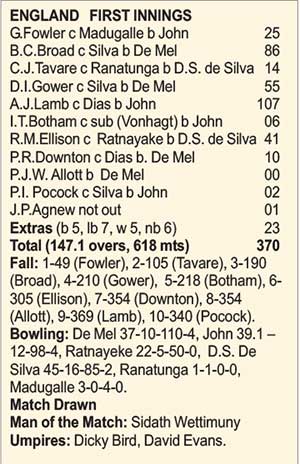 Had England the imagination or desire to give themselves the slightest sniff at a possible chance of victory, they might have rotated the strike and pushed up the run rate, allowing themselves the opportunity to declare sometime after the follow on was averted. But Gower ‘s intransigence and lack of enterprise had been a feature throughout the match. Accordingly, Sri Lanka went into the fifth day, knowing full well the game would only be one of academic interest. Allott pulling a muscle left the proceedings after only one over, while Agnew’s front foot was eternally at odds with the popping crease. This meant that Pocock had to manfully bear the brunt of the attack, along with Botham who was finally reduced to bowling off spin to men adept at playing them in their sleep. That he captured six of the seven wickets to fall may not fully reflect the merit of his performance, although initially, he found some rhythm and swing and snaked a few past the defense of some of the early batsmen. During this effort, Botham surpassed both Fred Trueman and Lance Gibbs’ Test wicket hauls and became the third in line, behind Dennis Lillee and Bob Willis in the all time highest wicket takers’ list at the time. With the 80th over bowled, Sri Lanka declared, to bring to a close a game which was meandering without purpose. It was an ending the tired Englishmen embraced with open arms and a huge sigh of relief.
Had England the imagination or desire to give themselves the slightest sniff at a possible chance of victory, they might have rotated the strike and pushed up the run rate, allowing themselves the opportunity to declare sometime after the follow on was averted. But Gower ‘s intransigence and lack of enterprise had been a feature throughout the match. Accordingly, Sri Lanka went into the fifth day, knowing full well the game would only be one of academic interest. Allott pulling a muscle left the proceedings after only one over, while Agnew’s front foot was eternally at odds with the popping crease. This meant that Pocock had to manfully bear the brunt of the attack, along with Botham who was finally reduced to bowling off spin to men adept at playing them in their sleep. That he captured six of the seven wickets to fall may not fully reflect the merit of his performance, although initially, he found some rhythm and swing and snaked a few past the defense of some of the early batsmen. During this effort, Botham surpassed both Fred Trueman and Lance Gibbs’ Test wicket hauls and became the third in line, behind Dennis Lillee and Bob Willis in the all time highest wicket takers’ list at the time. With the 80th over bowled, Sri Lanka declared, to bring to a close a game which was meandering without purpose. It was an ending the tired Englishmen embraced with open arms and a huge sigh of relief.
Near twin centuries
But that ending came not before another show-piece effort from Mendis who came within a whisker of making twin centuries in his debut Test at Lord’s. Had he done so he would have joined the famous George Headley as only the second in the game’s history to do so. Mendis biffed the bowling with such gay abandon, he made 94 in 97 balls in just over two hours of batting, while reducing Botham to bowling off spin off just two paces, as the effort of a run up wasn’t worth it. Apart from Mendis, the white-helmeted Amal Silva contributed to the score with an unbeaten 102. It was his maiden first class hundred and in only his second Test match.
Unprecedented publicity
No one would deny Sri Lanka’s magnificent showing at Lord’s added considerably to their rising cricketing stock. In fact, no amount of Ambassadors or Politicians could have matched or done more to get their country such creditworthy mention in every single major English newspaper and every single BBC World Service news bulletin for the better part of a week. Had they a more penetrative attack and had their fielding been consistently sharper, the Lankans might have pulled off an improbable win and added to England’s woeful record of losing every single Test match that summer. Though drawn, England were at the receiving end for most of the match and deserved the sobriquet of possibly, the weakest Test team among the seven Test playing nations at the time. While it was an unforgettable Test match for the Sri Lankans, for England the experience was a bolt out of the blue and brought down the curtain on a most forgettable summer.
- News Advertiesment
See Kapruka’s top selling online shopping categories such as Toys, Grocery, Flowers, Birthday Cakes, Fruits, Chocolates, Clothing and Electronics. Also see Kapruka’s unique online services such as Money Remittence,News, Courier/Delivery, Food Delivery and over 700 top brands. Also get products from Amazon & Ebay via Kapruka Gloabal Shop into Sri Lanka.
Sports
Imran steals the show!

(This article by The Island’s respected cricket columnist Rohan Wijeyaratne first appeared in these pages 16 years ago; on the 11th of June 2005. As World Cup winning former captain and current Prime Minister of Pakistan Imran Khan has just visited the island, we reproduce this article in today’s edition)
In my youth – which is to say, quite a long time ago – I would often go to the YMCA canteen for a snack and a tea after whatever business that brought me to the Fort. Doing the same recently more for old times sake than anything else, I saw a familiar figure ahead of me heading in the same direction. Quickening my step and drawing abreast, I introduced myself to the gentleman concerned. He was none other than my old school English teacher, V. Thanabalasingham.
Not just a teacher, but an Institution
Those of you who may have passed through the portals of Ananda College during the 1960s and the early 70s and no doubt been well rounded in many ways, will admit to a man that when it came to the teaching of English, the name Thanabalasingham held no peer. In his prime, he was not just a brilliant teacher but an Institution. And volumes wouldn’t suffice to do him justice – such was the impact he made on all whom he touched, be it with the brilliance of Thackeray, Dickens, Chaucer or the Direct Method English Course that served as our bread and butter in English education at the time.
Another, from a different mould
Another teacher from an entirely different mould was Upali Ratnayake, now the Executive Director of CIMA. At the time he was introduced to us at the ‘A’ level stage, he appeared to our free spirits a cut above the rest. He acquired this status by doing exactly the opposite of what he was expected to do, which was to teach us English as a preparatory step towards an easier passage through University. Upali Ratnayake actually taught us nothing. Yet we learnt a good deal off him, discussing almost everything other than the subject he was paid for! His most endearing virtue was that he never spoke to us from a great height. And in that process, he taught us one of the most lasting lessons in life.
Several decades later, I nearly fell off my chair to receive a phone call from him inviting me to the BMICH on the 28th of May where Imran Khan and Kumar Sangakkara were due to speak at the CIMA Global Leaders Summit. The topics for discussion were “Passion for Perfection” and “Ordinary people in extraordinary acts.” The topics and the speakers seemed irresistible. And so I went.
What a speech!
I wasn’t disappointed. Neither were hundreds of others present. And predictably, Imran stole the show. Blessed with a presence that would have put any Grecian god to second class status, this tall, elegant and immensely handsome man spoke with such brilliance, clarity and articulation, the end result was as gripping as it was inspiring. In his wake, those who followed appeared cumbersome and dreary, almost like how Kenny Mackay would appear after the brilliance of a vintage Sobers or a Dexter! Kumar Sangakkara having to make do with less time than was his rightful share went largely unheard, tending to speak more to his fellow panelists than his audience. He will learn. As a probable hot contender to the top post after Atapattu, there will be many more occasions where he will be required to speak in public.
“Ambition must be upgraded, never downgraded”
Imran was of the view that all humans were endowed with limitless potential. Their limits if any, were often self imposed. Those who achieved extraordinary heights were those who dared to go beyond their self imposed limits. They thought big, dreamed big and did not allow their limitations to get in the way of achieving their dreams. He drew parallels from his own experiences in cricket, his cancer hospital project and his involvement in national politics to establish the point.
The four secrets
Starting with cricket, and drawing parallels with other legends including Zaheer Abbas, Imran stressed the need for a clear vision, the hunger to succeed, the willingness to sacrifice and self belief as being the four secrets to achieve one’s vision. Self belief was a factor which Abbas, despite all his God given gifts, had in very short supply. Imran, on the other hand, was full of it (sometimes foolishly!), because he never thought he ever could lose a game each time he stepped on to a cricket field. He gave many examples of it, including the victories against the might of the ‘invincible’ West Indians in 1986 against all odds. And that, despite having requested and got, ‘neutral’ umpires in a home series in Pakistan! He just wanted to make sure that when they won, there would be none to say that the umpires had anything to do with it!
Drawing from examples of his own life, Imran said that in all one’s life, one would hear others say why something cannot be done. That if accepted, would be the start of everyone’s downward spiral. Ambition he said, must be upgraded, never downgraded. And the more you pit your mind against the winds that resist you from reaching your ambition, the stronger your mind will become. Therefore, ambition must take precedence over everything. And towards achieving that, one should be willing to sacrifice anything. “Compromise” said Imran “for your vision, but never ever on your vision.” Great words!
Why the 3rd world is the 3rd world!
Relating what made him take to politics, Imran said that the problem with the third world was that the ruling elite would put itself above the law and deprive the ordinary folk of any justice. Hence his political movement was primarily meant to establish the rule of law in his country, where the weak and the strong were equal in the eyes of the law. “No society in the history of mankind has ever progressed without the rule of the law. The reason why the third world remained the third world was because it had very poor rule of the law. The elitist types did whatever they wished and got away with it, while the common man and the small and medium industrialist were all deprived of justice.” None could have spoken a truer word!
The ways of the mafia
Imran went on to say that when fighting for the rule of Law, one would be pitted against entrenched vested interests; the most powerful elite in the country. These were those who could buy justice. In Imran’s case, these were men who were also his good friends. Yet he preferred to take on the mantle of a social pariah instead, preferring to stand steadfast to his vision. The mafia usually reacts in such situations in either of two ways. They would either eliminate you or make you join the system. Just five months after his party was formed, he was offered 30 seats in Parliament out of 270. Imran refused, because he realized he had no chance of winning against entrenched political families that controlled his country. He knew the moment he joined them, he would need to compromise with his vision. So he refused, and got wiped out at the elections.
Refusing the Prime Ministership of Pakistan
When General Musharaff took over with Pakistan’s fourth military dictatorship in its brief history, he made all the right noises such as ridding the country of “sham” democracy and so on. No sooner Musharaff formed his own party, Imran was yet again invited, this time to become the Prime Minister of Pakistan. “But when I discovered that joining his coalition meant joining the biggest crooks in the country,” he had no difficulty in refusing. He was chided for his decision by many who argued that he could have joined and then fixed things up. But Imran said the decision was easy to make, as his vision was very clear. And it was one’s vision that decided when to compromise and when not to.
Imran’s vision
Imran’s vision was an independent and credible judicial system in Pakistan. So he asked himself the question, could General Musharaff afford an independent judiciary? The answer to him was obvious. If such a judicial system prevailed, most of the powerful men in his country would be tried for treason under article six of the country’s constitution. The sentence for treason was death. And he was therefore convinced that neither Musharaff, nor those around him could afford an independent and credible judicial system. And so, with his firm “No” Imran watched his party being destroyed yet again, to one seat, in parliament. This time it was by General Musharaff himself.
(To be continued tomorrow)
Sports
Spinners give India early advantage in third Test
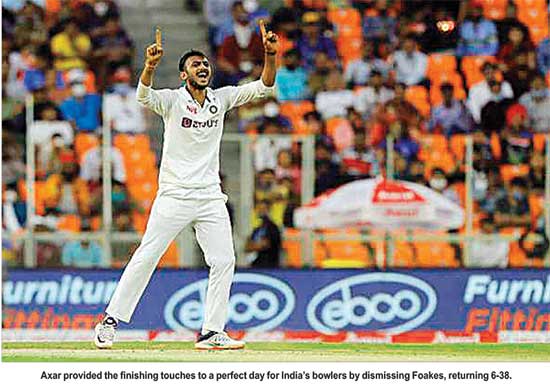
Indian spinners shot England out for just 112 inside two sessions with Ravichandran Ashwin and Axar Patel sharing the spoils after pacer Ishant Sharma opened the floodgates in his milestone 100th match on the opening day of the day-night third Test in Ahmedabad yesterday.
England were all out for 112 in 48.4 overs in the second session on a spin-friendly Motera pitch with Patel (21.4-6-38-6) grabbing his second five-for in his second Test while Ashwin (16-6-26-3) took three.
Openers Rohit Sharma (5) and Shubman Gill (0 ) negotiated five overs to take India to five for no loss at the dinner break.
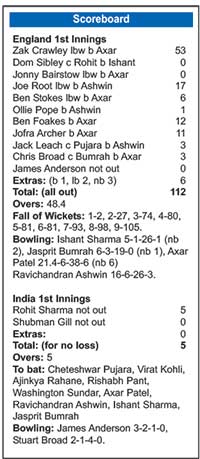 Gill, however, survived after TV umpire ruled him not out in the third over after England claimed for a catch.
Gill, however, survived after TV umpire ruled him not out in the third over after England claimed for a catch.
Ishant, only the second Indian fast bowler after Kapil Dev to play in 100 Tests, fittingly took India’s first wicket in the third over as he dismissed opener Dominic Sibley for nought.
Thereafter, it was all an Ashwin and Patel show as the duo bamboozled the England batsmen to complete the submission, except for the other opener Zak Crawley, who hit an eminently delectable half-century. Six English wickets fell in the second session.
England did not have any substantial partnership with the 47-run stand for the third wicket being the highest. They lost their last seven wickets for just 38 runs.
Crawley’s brilliance was, however, neutralised by the Indian spinners as England were left reeling at 81 for four going into tea after an exciting opening session in the pink ball Test.
Two wickets fell in as many overs after the resumption of the second session, with Ashwin and Patel taking one each, to reduce England to 81 for 6.
Ashwin sent Ollie Pope’s (1) off-stump cart-wheeling with a beauty of a delivery, bowling round the wicket, before Patel trapped Ben Stokes (6) LBW in the next over with a ball that spun in.
Jofra Archer (11) did a tad better as he hit a four in the second ball he faced and another boundary off Ashwin. But, Patel had him soon, cleaning up his off-stump to send England innings into a mess.
England’s rapid slide continued with Jack Leach edging one to the gully where Cheteshwar Pujara took a low catch off Ashwin, though the TV umpire took time to confirm the decision.
Crawley’s effort was the only silver lining for England. Having missed the first two Tests due to a freak wrist injury, the stylish right-hander’s driving was elegance personified as he hit ten boundaries during his 84-ball 53.
Sports
Top players secure third round places
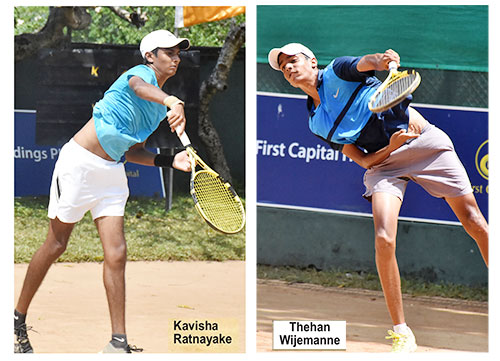
SSC Open Ranking Tennis
Thehan Wijemanne, Kavisha Ratnayake, Vibuda Wijebandara, Savith Weerasinghe, Kiran Viravanathan, Archana Lokuge advanced to the men’s singles third round at the SSC Open Ranking tennis tournament on Tuesday.
Some of the leading players fighting to improve on their impressive performances produced at the Tennis Nationals and the Colombo Championships during recent weeks knocked out their opponents easily to secure third round places.
